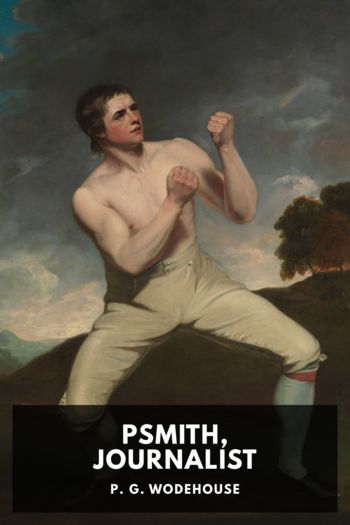Leave It to Psmith by P. G. Wodehouse (best ereader for academics TXT) 📕

- Author: P. G. Wodehouse
Book online «Leave It to Psmith by P. G. Wodehouse (best ereader for academics TXT) 📕». Author P. G. Wodehouse
Mr. Keeble, as he sat in the barber’s chair going over this letter in his mind, had groaned in spirit, while Jno. Banks with gleaming eyes did practically what he liked with the heliotrope bottle. Not for the first time since the formation of their partnership, Joseph Keeble was tormented with doubts as to his wisdom in entrusting a commission so delicate as the purloining of his wife’s diamond necklace to one of his nephew Freddie’s known feebleness of intellect. Here, he told himself unhappily, was a job of work which would have tested the combined abilities of a syndicate consisting of Charles Peace and the James Brothers, and he had put it in the hands of a young man who in all his life had only once shown genuine inspiration and initiative—on the occasion when he had parted his hair in the middle at a time when all the other members of the Bachelors’ Club were brushing it straight back. The more Mr. Keeble thought of Freddie’s chances, the slimmer they appeared. By the time Jno. Banks had released him from the spotted apron he was thoroughly pessimistic, and as he passed out of the door, “so perfumed that the winds were lovesick with him,” his estimate of his colleague’s abilities was reduced to a point where he began to doubt whether the stealing of a mere milk-can was not beyond his scope. So deeply immersed was he in these gloomy thoughts that Eve had to call his name twice before he came out of them.
“Miss Halliday?” he said apologetically. “I beg your pardon. I was thinking.”
Eve, though they had hardly exchanged a word since her arrival at the castle, had taken a liking to Mr. Keeble; and she felt in consequence none of the embarrassment which might have handicapped her in the discussion of an extremely delicate matter with another man. By nature direct and straightforward, she came to the point at once.
“Can you spare me a moment or two, Mr. Keeble?” she said. She glanced at the clock on the church tower and saw that she had ample time before her own appointment. “I want to talk to you about Phyllis.” Mr. Keeble jerked his head back in astonishment, and the world became noisome with heliotrope. It was as if the Voice of Conscience had suddenly addressed him.
“Phyllis!” he gasped, and the letter crackled in his breast-pocket.
“Your stepdaughter Phyllis.”
“Do you know her?”
“She was my best friend at school. I had tea with her just before I came to the castle.”
“Extraordinary!” said Mr. Keeble.
A customer in quest of a shave thrust himself between them and went into the shop. They moved away a few paces.
“Of course if you say it is none of my business …”
“My dear young lady …”
“Well, it is my business, because she’s my friend,” said Eve firmly. “Mr. Keeble, Phyllis told me she had written to you about buying that farm. Why don’t you help her?”
The afternoon was warm, but not warm enough to account for the moistness of Mr. Keeble’s brow. He drew out a large handkerchief and mopped his forehead. A hunted look was in his eyes. The hand which was not occupied with the handkerchief had sought his pocket and was busy rattling keys.
“I want to help her. I would do anything in the world to help her.”
“Then why don’t you?”
“I—I am curiously situated.”
“Yes, Phyllis told me something about that. I can see that it is a difficult position for you. But, Mr. Keeble, surely, surely if you can manage to give Freddie Threepwood two thousand pounds to start a bookmaker’s business …”
Her words were cut short by a strangled cry from her companion. Sheer panic was in his eyes now, and in his heart an overwhelming regret that he had ever been fool enough to dabble in crime in the company of a mere animated talking-machine like his nephew Freddie. This girl knew! And if she knew, how many others knew? The young imbecile had probably babbled his hideous secret into the ears of every human being in the place who would listen to him.
“He told you!” he stammered. “He t-told you!”
“Yes. Just now.”
“Goosh!” muttered Mr. Keeble brokenly.
Eve stared at him in surprise. She could not understand this emotion. The handkerchief, after a busy session, was lowered now, and he was looking at her imploringly.
“You haven’t told anyone?” he croaked hoarsely.
“Of course not. I said I had only heard of it just now.”
“You wouldn’t tell anyone?”
“Why should I?”
Mr. Keeble’s breath, which had seemed to him for a moment gone for ever, began to return timidly. Relief for a space held him dumb. What nonsense, he reflected, these newspapers and people talked about the modern girl. It was this very broad-mindedness of hers, to which they objected so absurdly, that made her a creature of such charm. She might behave in certain ways in a fashion that would have shocked her grandmother, but how comforting it was to find her calm and unmoved in the contemplation of another’s crime. His heart warmed to Eve.
“You’re wonderful!” he said.
“What do you mean?”
“Of course,” argued Mr. Keeble, “it isn’t really stealing.”
“What!”
“I shall buy my wife another necklace.”
“You will—what?”
“So everything will be all right. Constance will be perfectly happy, and Phyllis will have her money, and …”
Something in Eve’s astonished gaze seemed to smite Mr. Keeble.
“Don’t you know?” he broke off.
“Know? Know what?”
Mr. Keeble perceived that he had wronged Freddie. The young ass had been a fool even to mention the money to this girl, but he had at least, it seemed, stopped short of disclosing the entire plot. An oyster-like reserve came upon him.
“Nothing, nothing,” he said hastily. “Forget what I was going





Comments (0)